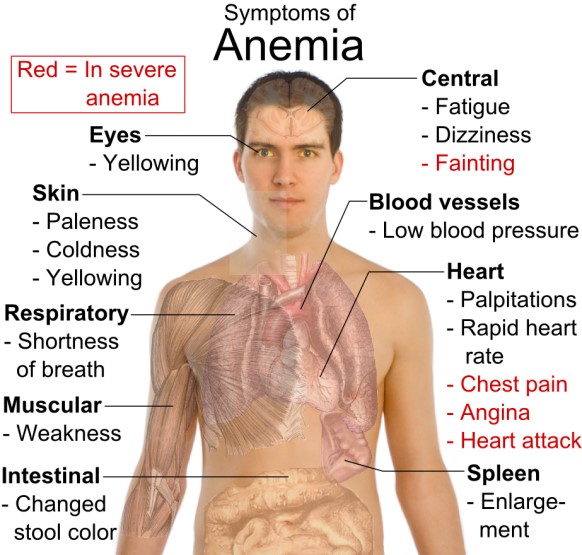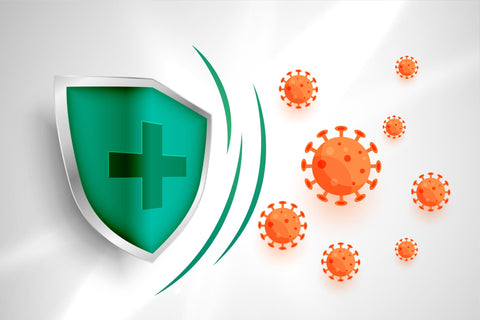Anaemia, also known as anemia, occurs when your blood has an insufficient number of red blood cells or if they don’t have enough hemoglobin.
In megaloblastic anaemia, due to vitamin B12 deficiency (very common nowadays), red blood cells are larger in diameter and fewer in number. Megaloblastic anaemia takes place when red blood cells aren’t produced properly. Because they are too large, they may not be able to exit the bone marrow to enter the bloodstream and deliver oxygen.

Symptoms Of Anemia
Since red blood cells can’t provide proper amount of oxygen to the body cells including brain and muscles, anaemia leads to tiredness, muscle weakness, brain fog, inability to concentrate, and may cause even mood changes.
Other symptoms may include the following: lack of appetite, constipation, irritability, dry mouth, pale skin, headaches, cold or numb hands or feet, shortness of breath, dizziness, chest or abdominal pain, low body temperature, black, tarry, or bloody stools (from blood loss), rapid or irregular heartbeat (arrhythmia), etc. Severe anemia can sometimes cause more serious complications, including damage to the heart, brain and other organs.
Most Common Causes Of Anemia
-
Vitamin B-12 (most common cause) and Folate (Vitamin B9) deficiency.
-
Other causes may include: Malnutrition, malabsorption, age, cancer, drugs, medication (metformin, etc.), stress, refined diet, stimulants, hormonal imbalance (thyroid), chronic inflammation, bleeding (menstruation, haemorrhoids, stomach ulcers), liver dysfunction & toxicity, rheumatoid arthritis.
Nutritional Supplements For Anemia
-
Methylcobalamin (best form of B12) such as HealthAid Metcobin (must be sublingual) 2,000 a day under the tongue (only with breakfast). After 3 months take 1,000mcg a day (after breakfast).
-
Take L-methylfolate or Folic acid: 400 mcg twice a day with meals for one month. After that 200-400 mcg a day.
-
Vitamin D3 supplements (20-30,000 IU a day) as it assists in making of blood. Take also magnesium as vitamin D3 leads to its deficiency.
-
Vitamin C (only in the form of L-ascorbic acid): not less than 1,000mg with breakfast,
-
Other vitamins and minerals: B6 (100mg a day), B3 (Niacin), Zinc (30mg a day), Copper (2mg), Pantothenic acid (100mg), Biotin.
-
Take good live probiotic such as UltraProbio, ImmuProbio or DailyProbio (some probiotic species found in the above supplements make B12 in the small intestine).
-
Iron bisglycinate 1-14mg daily. Iron in spirulina is 45 times more concentrated than in spinach! Chlorella and Molasses (2 tablespoons a day) are also very good sources of iron.
-
Eat more: Green leafy vegetables, spinach, parsley leaves, black eyed beans, dry fruit (especially peaches and apricots).
-
Avoid: Coffee, dairy products (contain very little iron and tend to bind iron present in other foods).
-
Sleep seven to eight hours.
-
Exercise stimulates the bone marrow to produce blood cells and promotes the absorption of iron.
Related Articles
Image by cookie_studio on Freepik
Any information or product suggested on this website is not intended to diagnose, treat, cure or prevent any medical condition. Never disregard medical advice or delay in seeking it because of something you have read on this website. Consult your primary healthcare physician before using any supplements or making any changes to your regime.




